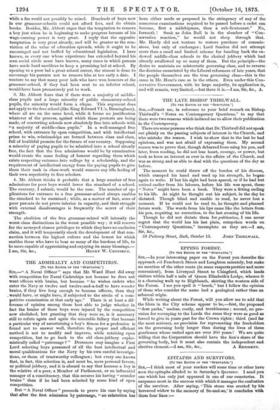THE LATE BISHOP THIRLWALL.
[TO THE EDITOR OF THE "SPECTATOR."] Six,—Permit me, in reference to your brief remark on Bishop Thirlwall's "Notes on Contemporary Questions," to say that there were two reasons which induced me to allow their publication in the Contemporary.
There are some persons who think that Dr. Thirlwall did not speak out plainly on the passing subjects of interest in the Church, and who mistake the reason. I wish tcr show that to the last he had opinions, and was not afraid of expressing them. My second reason was to prove that, though debarred from using his pen, and later, from reading, he did not lose heart, courage, or power, but took as keen an interest as ever in the affairs of the Church, and was as strong and as able to deal with the questions of the day as• before.
The moment he could throw off the burden of his diocese, which cramped his hand and used up his strength, he began• again to write. If but his sight had been spared, or if he had but retired earlier from his labours, before his life was spent, these- " Notes " might have been a book. They were a fitting ending- to his life. At night he thought out his subject, in the day he dictated. Though blind and unable to read, he never lost a moment. If he could not be read to, he thought and planned future work. The words from his lips came like the letters from his pen, requiring no correction, to the last evening of his life.
Though he did not dictate them for publication, I can never regret that the world has his last plain, outspoken words on "Contemporary Questions," incomplete as they are.—I am,. Sir, &c., 59 Pulteney Street, Bath, October 13. Jomv THIRLWA.LL.


































 Previous page
Previous page